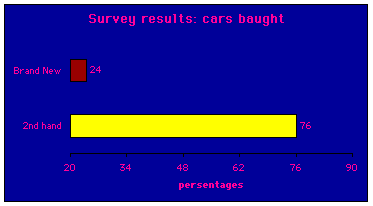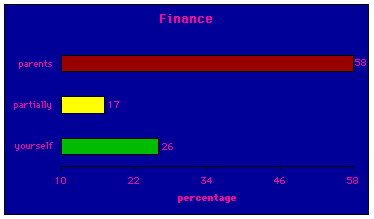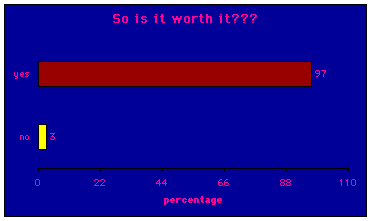Welcome
to our Original Math Project
Teachers comments are
placed throughout this project in green
Site Contents: Introduction
| Survey |
Results | Graphs |
Consideration |
End of Page
This research
project was conducted by Erin and Yvette, for the purposes of
the University of Saskatchewan. We interviewed some people(teenagers
presently in high school) about why they owned a car, and how
they financed their car. The object of the project was to find
out whether it is really
worth owning a car while still in high school.

Our Sample
Survey: This survey was distributed through the hallways of our
lovely high school, Marion M. Graham. Check it out and see what
you would say! Survey: 1. How much did you pay for your car? 2.
Is it second hand or brand new? 3. How did you pay for your car?
- partial help from parents - entirely by parents - by yourself
4. Do you have a job? 5. How do you finance
your car? - partial help from parents - entirely by parents -
by yourself 6. Approximately how much do you spend every year
on repairs? 7. How much do you spend on insurance, license plates
and gas? 8. What do you spend money on other than your car? 9.
What is the main reason you wanted a car? 10. What is the main
purpose for a car? 11. Now that you have a car, would you say
it is worth it while you are still in school?

- The
Survey Results: 1. Avg. price paid: $6040
- How did you make the
money to buy the car?
- What type of taxes
are there on cars?
-
- 2. Cars bought a) brand new:
24% (b) second hand: 76%
-
- 3. Way of paying the car
a) parents: 57% (b) partial help: 17% (c) yourself: 27%
- Was the parents money
a loan? Do you have to pay them back?
- Do you owe the interest?
-
- 4. Do you have a job: a)
yes:76% (b) no: 24 %
- How many hours can
you work in a week? Day?
-
- 5. Avg pay/month: $338
- If so, what is the
wage you make?
- What is your salary, gross
wage, deductions, take
home pay, etc.
-
- 6. Way of financing car:
a) parents: 58% (b) partial help: 17% (c) yourself: 26%
- Are there other options
such as paying with a bank loan, paying in installments?
-
- 7. Avg spent on repairs:
$427
-
- 8. Avg spend on insurance
etc.: $1380
- How are insurance rates
calculated?
- Are they different
for various people, cars, situations?
-
- 9. Other things to spend
money on: Food,entertainment, other people, alcohol, cigarettes,
hobbies/sport
- Do you have a budget you follow?
- What other things do
you need to include in your spending?
- Do you need to worry
about saving money for University?
-
- 10. Main reason for wanting
a car: Getting to school, hobbies, sport, responsibility, independence
- Is there other ways
you could do this--bus, car pool etc.
-
- 11. Main purpose of car:
Getting to school/sport/hobbies/job, driving others around, running
errands
-
- 12. Is it worth it: a) yes:
97% (b) no: 3%
- What factors make it
worth it?
- Are they the same for
everyone?
Our work showed us, that it is quite
obvious financially not worth it to own a car. This is demonstrated
by the amount of money students spend to support their car. Unless
their parents pay for it, they have to pay for gas, insurance,
and licensing. This is a major drain on their bank account. Also,
they need to have jobs and have less time for studying. However,
as one student put it "What you loose in money, you make
up in style". The students with cars felt more independent
and responsible. Surprisingly, most students did not mention the
popularity factor.
- If it is financially
not worth it, why did 93% of the students consider it "worth
it"
- What other factors
were they considering?
- What types of cars
are most economical for students to drive, all factors
considered?





Some
more things to consider:
- 1) Gas prices rise and fall
with the time.
- How are gas prices
determined and what makes them rise and fall?
-
- 2) Accidents kill!!! (and
when they don't, they're expensive)
- What
makes accidents expensive?
-
- 3) The cheaper the car, the
more the repairs will cost.
- 4) Don't drink and drive
- 5) Remember to insure your
car, even if it's expensive
- How are insurance rates
determined.
- Why are they different
for various people
-
- 6) The highest accident rate
in in the 18-25 range
-
- University
of Saskatchewan
- Saskatchewan
Government Insurance
-
- Yvette & Erin
-
-
- Top of
Page
-
- Unique
Project | Student Projects Home Page







